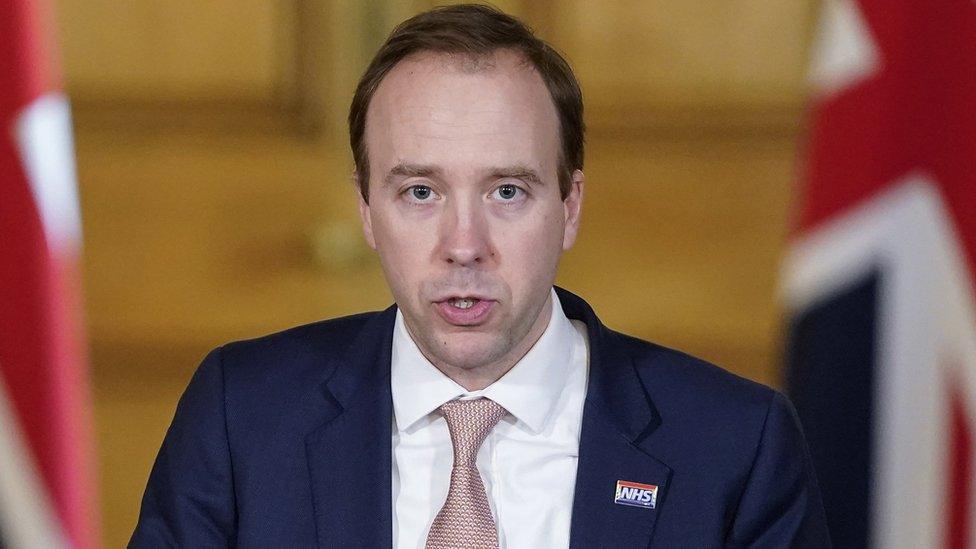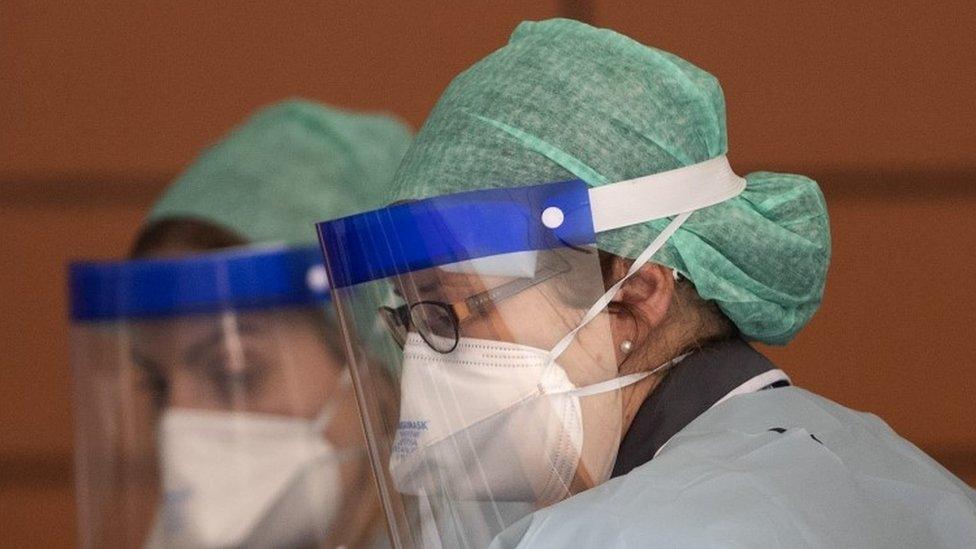Coronavirus: Questions over decisions made at start of outbreak
- Published
- comments

This is not an episode of Yes Minister, where the carefully crafted communications of top officials and ministers are fodder for jokes.
But there is now a rather mysterious situation in Whitehall over some of the decisions that were taken, or not taken, at the outset of this crisis, over what has emerged as one of the trickiest issues.
You may or may not remember that near the start of this pandemic, the government took a lot of heat over the decision not to take part in an EU-wide effort to pool efforts to purchase the equipment that would be vital for health services to deal with the crisis - including ventilators and personal protective equipment.
For context, the UK had been a member of the Joint Procurement Agreement deal since 2014.
As the coronavirus epidemic was starting to take hold, the UK had just departed the EU, but still had the ability during the transition period to take part in those kinds of deals - which may or may not be prove to be effective - as countries around the world were trying to find ways to source vital kit as demand was set to grow and grow.
When it emerged that the UK was not taking part in the scheme, ministers and Downing Street offered explanations that the UK had not taken part because we were leaving the EU, and then that there had been a mix-up over EU emails being sent to the wrong address, even though UK officials had been part of some discussions with EU counterparts.
Crucially, they were adamant there had not been a decision to keep out of the schemes for political reasons and, importantly, that the UK would not miss out in any case. (Here is Michael Gove talking about what happened at the end of last month).
On Tuesday, however, one of the country's most senior officials, Sir Simon McDonald, was quizzed on exactly what had happened by a group of MPs and told a very different tale.
With hardly any hesitation, he said - in direct contradiction to the government line - that there had been a "political decision".
Sir Simon McDonald spoke to the Commons Foreign Affairs Committee by video link
Eyebrows in Westminster shot up immediately at someone in his position of authority in Whitehall taking such a different position.
Within hours he was, in turn, directly contradicted by the health secretary at Tuesday afternoon's Downing Street briefing, when Matt Hancock said there had been "no political decision".
Unusual enough for a senior official and a senior minister to be giving such different pictures.
Then, a couple of hours later, a letter emerged from Sir Simon saying that there had been a misunderstanding and he had been wrong (although it's worth noting he denied specifically that UK officials in Brussels had briefed ministers).
It might sound like splitting hairs, but that is different to saying that no such conversations ever took place.
Bear with me, though - that may not be the end of the affair.

A SIMPLE GUIDE: How do I protect myself?
AVOIDING CONTACT: The rules on self-isolation and exercise
HOPE AND LOSS: Your coronavirus stories
LOOK-UP TOOL: Check cases in your area

'Added dilemma'
Sources who were part of discussion at the government's emergency Cobra meetings around the time of the start of this crisis - and around the time of our departure from the EU - say there was a discussion involving Mr Hancock about the sensitivities of working with the EU.
One source said the health secretary had acknowledged the political delicacies of working with the EU in preparing for the crisis on a range of issues, and was urged to put the politics aside.
One minister present recalls the matter was discussed and, while there was no decision made during the conversations about preparations that could be made in conjunction with the EU, it was clear there was an "added dilemma" because of the unfolding politics of our departure from the bloc.
Sources close to the health secretary now strongly dispute the notion that there was any discussion of the specific procurement schemes at Cobra at that stage, and stress that ideology has never stood in the way of sourcing the equipment that's needed.
In any case, the EU schemes are yet to deliver supplies of either ventilators or PPE, so the question of why the UK didn't take part is perhaps academic.
In addition, the UK has now signed up to a procurement round in the hope of finding therapeutic treatment.
But the confusion now is another reminder of the government's difficulties fixing the specific but vital issue of sourcing the kit that health workers need.
It's a question that is likely to come back time and again, as reports from staff on the ground in some areas paint a different picture to ministers' hopes of solving the problem.
- Published21 April 2020

